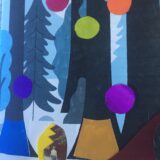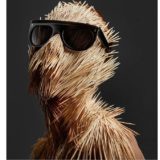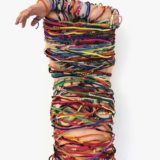This is Mary Ruefle from her essay, The Gift:
“The day the living room flooded I had not left the apartment in five days, everything was spotlessly clean, I had no work to do except writing my thoughts in a journal, the thought of which filled me with terror and boredom. That fateful and final morning I was in bed reading, unable to concentrate because of what I had done the day before. The day before I had ordered by telephone a large gift box of glace’ apricots from Australia. The catalogue, South Sea Gifts, showed the fruit in a handsome wooden crate, lined with gold foil. They cost $86.20 and I had them sent to myself with a gift card that said from Mary to Mary. I was uneasy because I now had no money to buy groceries with and it would be some time before the apricots arrived, even though I had them sent express, which cost more. I looked forward to their arrival but at the same time they would, when they arrived, only remind me of my stupidity and terrible guilt”.
Ruefle begins her essay with opposing images of a flood and things left spotlessly clean. Somehow, even when things are spotlessly clean, and we start over with a clean slate, our minds start filling up, with things like desire, terror, boredom and a flood of feelings that sometimes we cannot even yet name.
Mary has treated herself with such care, in gifting herself these desired apricots, and deliberately names the giver and the receiver by name. Mary is the giver and the receiver! She, Mary, in her unique appetites come so magnificently into view, but there is guilt and terror in this deliberateness. She tries an internal negotiation. “The cheaper ‘home boxes’ had more apricots in them, but were without gold foil. The gold foil looked so nice, shining beside the golden apricots”.
The foil and glace’ around these apricots is so beautiful, and creates an image of light. But does she really need this?
Audre Lorde writes about the value of experience and consciousness in Poetry is not a Luxury. “It is a vital necessity of our existence. It forms the quality of the light within which we predicate our hopes and dreams toward survival and change, first made into language, then into idea, then into more tangible action. ………a bridge across our fears of what has never been before.”
Mary had also thought of ordering “white cotton mosquito netting”, but “came to my senses. At least I could eat the apricots. What would I do with mosquito netting? I just like the way it looks–you can drape it over anything and the draped thing becomes soft and mysterious”.
Ruefle presents us with what seem like opposing images of desire and feelings, and coming to one’s senses. But that phrase alludes to thinking only, devoid of senses. But Mary is not only thinking, she is actually coming to her senses. She is fighting through the fog of guilt about desire, through the guilt of being a mind in a body with all those senses.
But she thinks, if you cannot immediately think of a practical use, what is the point of such imaginings? So when she discovers the flood, she knows with certainty she is to blame because of this “single indiscretion” It was fateful, after all, she knows she has done this before and will again; be imagining things in her mind, feeding off them, as essentially as her other life necessities.
Ruefle writes, “And in this way another day of potential reverie had been broken in two, utterly destroyed by my desire for an apricot, a single indiscretion for which my habitat had become a village of sticks on the banks of a rising river, where trade winds blew and the rains came and mosquitoes bred; and where mosquitoes breed, one will be needing some netting”.
The reverie broken not by desire but by guilt for it, and certainly not completely…….still alive and well to now come to the rescue with mosquito netting, that drapes and “becomes so soft and mysterious.”
Be well,
Marlene
Mary Ruefle, The Gift in My Private Property
Audre Lorde, The Selected Works of Audre Lorde
Photograph by Rinzi Ruiz, @rinzizen, @rinziruizphotography
*Please support Independent Bookstores



